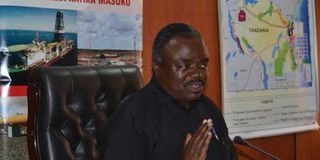TPDC ‘to engage Swala’

TPDC acting director general Kapuulya Musomba
What you need to know:
Swala Oil and Gas Tanzania Ltd, which had planned to roll out the project in 2016 following promising seismic data, says it has not secured permits.
Dar es Salaam. The Tanzania Petroleum Development Corporation (TPDC) has said it willing to engage oil prospecting firm Swala amid brewing tension over alleged bureaucratic bungling in the issuing of oil drilling permits for the Kilosa-Kilombero project.
Swala Oil and Gas Tanzania Ltd, which had planned to roll out the project in 2016 following promising seismic data, says it has not secured permits.
The company accuses government agencies of dragging their feet.
In a statement, the firm also notes that it was disappointed and frustrated by the last-minute additional requirement by government to assess whether or not using water from the Rufiji river complex would have any impact on the Stiegler’s Gorge Hydroelectric Project.
TPDC acting director general Kapuulya Musomba told The Citizen early this week that they will assess the claims and respond appropriately.
“I have seen the Swala statement and started working on it. I do not want to go into details but we will sit together, talk, understand the issues and see how we move on,” he said.
TPDC is the national oil company, which also implements government’s petroleum and exploration policies.
On Monday, the Dar es Salaam Stock Exchange-listed firm declared “force majeure” – a legal clause which removes liability from the company for not fulfilling a contractual obligation due to unforeseeable circumstances – saying the additional requirements affected the drilling programme.
Swala said the force majeure shall be lifted once all permits are in place to allow the safe drilling of Kito-1 in 2019.
Kito-1 was assessed to potentially contain up to 185 million barrels of oil worth over $10 billion (over Sh22 trillion) at current prices.
But the drilling area is within a game-controlled area, which required a permit from the Tanzania Wildlife Authority (Tawa). The area is also said to be located some 200km from the Stiegler’s Gorge Hydroelectric Project, from which the government wants to generate 2,100 MW of electricity.
Swala said it carried out an environmental impact assessment (EIA), which was reviewed by institutions under the Vice President’s Office, and approved in 2017 after the amendments were reconsidered.
The company also said it wrote to the TPDC requiring all permits to be in place by April 20 this year but TPDC advised that the Ministry of Natural Resources and Tourism “required an in-house assessment of the impact of the Kito-1 drilling programme on the Stiegler’s Gorge Hydroelectric Project.”
The power project involves the construction of a dam designed to contain up to 34 billion cubic metres of water fed by the Rufiji river complex. The Kilombero River, close to the Kito-1 site, is part of the Rufiji river complex.
“The drilling operations are expected to last 21 days and use some 76 cubic metres of water a day, resulting in total usage of some 1,580 cubic metres of water (less than the water used in an Olympic-sized swimming pool),” stated Swala Oil and Gas Tanzania chief executive officer, Dr David Mestres Ridge.
“We are disappointed and frustrated by this last-minute requirement from the ministry. Over the past 6 years the Joint Venture has invested a total of $20.7million in exploring the Kilosa-Kilombero area and has been trying for three years to drill a prospect,” he added.
In February this year, TPDC announced that it was putting on hold a transaction in which Swala agreed with Orca to acquire up to 40 per cent of Orca’s wholly-owned Mauritius subsidiary, PanAfrican Energy Corporation (PAEM) which owns PanAfrican Energy Tanzania for a total consideration of up to $130 million.




